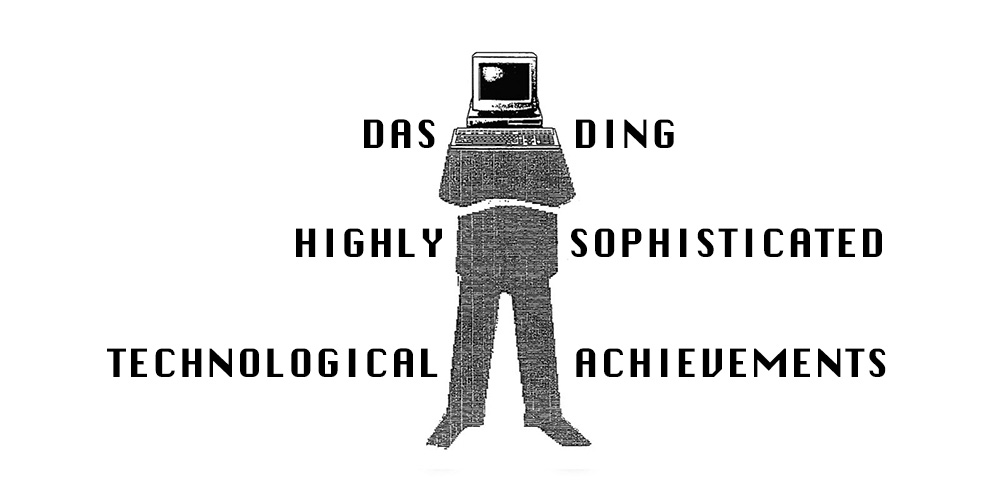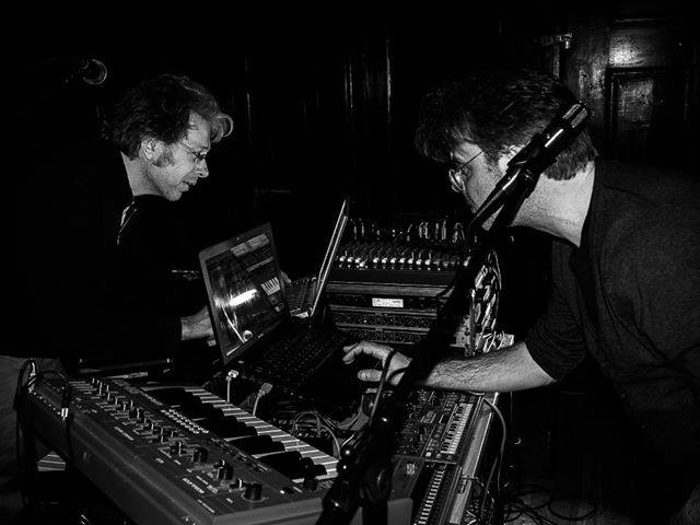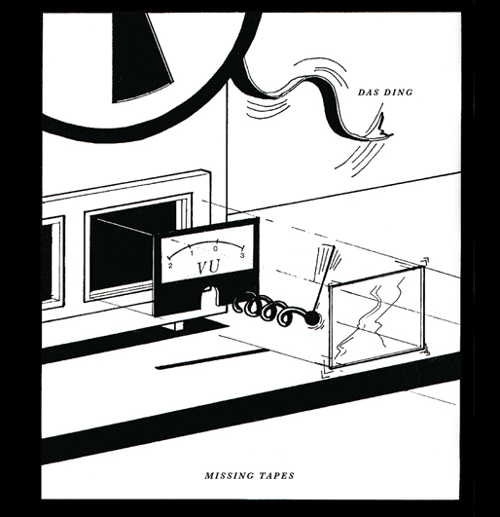Das Ding – Highly Sophisticated Technological Achievements

With the arrival of a new Das Ding collection on Minimal Wave, Danny Bosten discusses his 30-plus years of making music with Flora Pitrolo.
Peering down his round metal-framed glasses at me is Mr. Danny Bosten, his figure on the other side of the screen set to a backdrop of warmly lit array of modules and synths. He calmly alternates a drag on his fag, a sip from his beer, as I fiddle with the sound and set up the recording. Bosten looks at something beyond the screen, scribbles something down… A shudder of annoyance flashes across his face whenever he hears a burst of feedback.
The man on my screen is also known as Das Ding, one of the most thrilling electronic musicians of the early 1980s. Products of dedicated bedroom work, his early tapes became legendary to a new generation of fans in the blog boom of the mid-2000s. This resurgence of interest in the Bosten archive was later crowned by Minimal Wave’s 2009 anthology H.S.T.A., an acronym for Highly Sophisticated Technological Achievement and the name of his first 1982 tape. The title track – made up of a thick bass-synth puffing like a talking exhaust pipe, aggressive bursts of car horns, and a rain of rickety synthlines – has taken its deserved position amongst the great canon of minimal synth classics.
With his 1986 industrial tape as Schedelvreter also put out by Minimal Wave in 2012, the Bosten-Vasicka union is now closing the circle with the release of Missing Tapes, featuring more unearthed early-‘80s Das Ding material. I  inform Bosten, who doesn’t strike me as the kind of man who keeps an eye on hype, that the record comes with a lot of expectation, given Minimal Wave’s exploits of recent years.
inform Bosten, who doesn’t strike me as the kind of man who keeps an eye on hype, that the record comes with a lot of expectation, given Minimal Wave’s exploits of recent years.
“I was going to put them on Bandcamp as a digital release, and I sent them to Veronica (Vasicka) because I asked her to write a blurb for me. For me it was just a way of doing something with the leftovers, so to speak.” As ‘leftovers’ go, they’re rather impressive. “Well, Veronica offered to do it through her label so I could get more visibility and make more money. But because what she does is vinyl, she said ‘let’s just put them on vinyl instead.’” Bosten naturally accepted, “for me it was really just a way of finishing off the Das Ding archive,” he concludes, matter of factly.
This kind of unassuming pragmatism riddles my conversation with Bosten; he’s clearly someone used to working alone, to getting things done because they have to get done. Then, he can start on something else, and that something else will entice him. A monomaniac, and very probably someone who’s willing to suffer for his art.
“I’m on welfare at the moment in Rotterdam, and being on welfare in Rotterdam is hell. I used to work in schools, but they’ve cut so much funding for culture that that isn’t possible anymore.” As a result, he’s started his own business selling music, vinyl, and modular synths. “It’s going quite well,” Bosten reveals, adding he’s been booked to play some gigs in China. “It’s funny, I’m a bum in Holland and then they ask me to play in China!”
Bosten chuckles when I ask him how his teenage-self would have reacted, had he known that the music he was making would have proven to be so deeply and internationally loved 35 years down the line. More than surprised – after all, he has never stopped ‘modulating’ on the same set of ideas, principles and fascinations – his attitude is jovially nonchalant. People ask him to do things, he charmingly obliges. I try to get him to theorise with me, to speculate on the aesthetics of his music, and he elegantly humours me. Yet while he’s acutely aware of the value of his work, he doesn’t seem so interested in drawing conclusions.

Das Ding was born from the ashes of Bosten’s short-lived experience in a punk band called Spastix, some efforts of which are documented in Bosten’s 1982 compilation Kalkulator. His brother, who was also in a band, gifted him a rather large batch of equipment – an impressive arsenal that included a TEAC 4-track, Roland Space Echo, Roland SH101, Moog Prodigy, ARP Odyssey and a Roland CSQ100 sequencer. With a bedroom so magnificently kitted out, Bosten quite naturally embarked on his pursuit of highly sophisticated technological achievements under the banner of pop music. Pop music, he tells me, is all he ever wanted to make:
“I was in a small town in Southern Holland, and in small towns you have to find your own thing to do – and there’s this mythical thing called pop music that feels so distant and so magical. But that’s all gone now.”
“For me pop music is the greatest art form of the 20th Century. The idea that you can take a message and wrap it up in a joke – the idea of an artform that is so serious yet so frivolous, you know what I mean?” Pop music is still capable of this, Bosten feels, but he isn’t so sure artists can really do it they way they used to. “Maybe there’s just too much and it’s all fragmented… personally, I can’t keep up. At the time I used to listen to John Peel and I loved Kraftwerk, New Order, Fad Gadget… but there was an order to all of this, one thing led to another, there was a narrative, and that’s gone.”
Another ‘mythical’ tool of escapism for the young Bosten was science fiction, consumed in the form of books and films. His sources of aesthetic inspiration and his titles tend to come from sci-fi, from futurist sociology, philosophy, and theory. Das Ding’s name itself comes from the 1951 American film, The Thing from Another World, and from Immanuel Kant’s idea of das Ding an sich, the thing-in-itself versus the thing as it appears to an observer. The Das Ding track “Reassurance Ritual” references American writer Alvin Toffler, and his description of elections in his 1980 book The Third Wave as “a mass ritual of reassurance”, “symbolically assuring citizens that they were still in command,” when they clearly are not. Bosten turned the concept into a love song. Loss of political and technological control pervade his oeuvre.
“All of this music, this literature, these films seemed to work with this dark sense of paranoia that we were all living in; Thatcher, Reagan, the Cold War… in all of this atmosphere, for me using technology was a way of imagining a great technological future.” Or the horrors of a technological future? After all, the Das Ding archive is all quite ominous. “Yeah, that too. Now that we’re living in that future, maybe we can say it’s really the same thing.”

We talk about ‘now’ as the end times: everything absorbed by the machine of neo-liberalism, everything is fragment, the market eating up every flicker of free thought. Bosten acerbically notes we in Britain are also taking the 1980s revival a bit too far, “what are you doing, with this David Cameron guy!?” Tracing the lines between the then and the now, Bosten mournfully reflects on how Thatcher and Reagan were “the real punks… They said ‘no future’, it turns out they really meant it.”
Yet despite tuning into today’s feeling of apocalypse, Bosten isn’t one for slaying the present, nor for nostalgically idealising the past. When I ask about the acts he put out on his label Tear Apart Tapes – named, oh yes, after Joy Division’s “Love Will Tear us Apart” – he admits there was some kind of correspondence between artists going on, but he refuses the notion of there ever being such a thing as a ‘scene’, certainly not a Dutch one anyway. “People were making music, but we were mostly working alone. And a lot of those people were kind of narrow-minded Calvinists, whose music didn’t really reflect the way they were. Apart from 20-odd real eccentrics scattered between Holland and Belgium, there wasn’t a serious collective sense of scene”.
And now? Bosten’s recent Why is My Life so Boring? came out as the first record on Electronic Emergencies, one of a number of labels harnessing the electronic energies of the Lowlands. “Now in Rotterdam there are something like 15 labels – it’s amazing. I think some of it originated from The Hague, from the West Coast scene. Someone moved here, started a shop, then other people came, started a label, then another label… it’s actually so easy, so nice. All you need is a little money.”
Bosten’s role in all of this is that of a paternal onlooker: he listens, he participates, but he is ultimately faithful to his solitary scenelessness. When I catch up with him, he tells me he’d spent the previous week listening to The Beach Boys’ Pet Sounds “all day, everyday,” and that his new record of the week was Tuxedomoon’s 1981 album, Desire. He had also been listening to Minimal Wave records, preparing a mix of music from his own generation. “They’re really good. Vasicka sends me all these records and I never listen to them, but they’re actually really nice!”
 In general, Bosten doesn’t listen to electronic music – he listens to bands. And people send him things, so he gets a lot of “strange records”. I try to trace a continuum of electronic music and also connect it back to Das Ding, but Bosten predictably eschews the idea of his own influence. “I took my cue from other people, so if people take their cue from me it doesn’t really mean anything,” he suggests. “Anyone can do the things that I do, provided they have the right frame of mind and technical abilities.”
In general, Bosten doesn’t listen to electronic music – he listens to bands. And people send him things, so he gets a lot of “strange records”. I try to trace a continuum of electronic music and also connect it back to Das Ding, but Bosten predictably eschews the idea of his own influence. “I took my cue from other people, so if people take their cue from me it doesn’t really mean anything,” he suggests. “Anyone can do the things that I do, provided they have the right frame of mind and technical abilities.”
Technical abilities return time and again in Bosten’s world. When he started as Das Ding he was studying graphic design, and the idea of ‘design’ in a broad sense has always provided a main focal point. I ask him how graphic design informs his music, and Bosten admits minimal synth was and remains a very design-conscious genre. Not in a hipsterised sense, but simply as a way of thinking “graphically about composition, layers, lines and how different elements fit together”. We could even call it ‘modular’ thinking; using systems of thought, and how parts make a whole work.
“I want to make very simple music, like Kraftwerk did in the 1970s. I need something that goes ‘psh’ so I look for something that goes ‘psh’.” He professes a lack of interest in complicated, expensive hardware, “modular equipment that looks like space stations,” preferring cheap Roland gear. Designing inexpensive, accessible modules for synthesis – as his self-built Baby 8 sequencer that appeared in 2014 demonstrates – occupies Bosten greatly these days, and he is deeply embedded in the DIY synth scene.
“I’m part of this collective called Noodlebar. Everybody knows everybody else, it’s a very nice scene, and they’re all very supportive. They say ‘you should work more on this’, ‘you should release this,’ we help each other, we are interested in each other’s work. It’s amazing, the support I get from these people.” Bosten shows me the PDF of a fanzine he’s been working on called MASK Magazine. The first sentence of the editorial reads “ah, the sweet smell of fresh solder.”
As I leave The Thing, he reveals that after the Missing Tapes record, we can expect a series of 7’’ coming out on his own label, and that he might also take on the Schedelvreter project again, to come full circle on his industrial production too. Meanwhile he’s preparing for those gigs in China – but especially, first and foremost, for a Noodlebar gig the following night. So he’s finally found the spirit and solidarity of a DIY scene? “In a sense, yes, I think so. It’s very alive, very active, very addictive”. And, I venture, the perfect contemporary environment for his highly sophisticated technological achievements? “It’s also very gezellig, you know?” Boston responds with a laugh, teaching me a Dutch word that roughly translates to convivial, fun or cosy.
Flora Pitrolo
Missing Tapes is out now on Minimal Wave
Das Ding on Juno